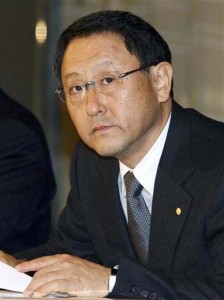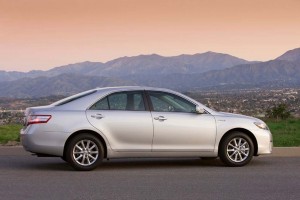Toyota has agreed to pay a record $32.4 million in fines levied by federal regulators for admittedly delaying the recall of six million potentially unsafe vehicles.
The settlement of the two separate probes by the National Highway Traffic Safety Administration caps a disastrous year for a Japanese automaker once reputed to build some of the safest and most reliable vehicles on the road. Since Toyota announced the first of two major efforts to resolve a so-called unintended acceleration problem, in late 2009, it has since recalled more than 11 million vehicles worldwide, most in the U.S.
Toyota paid a previous $16.4 million fine, last April, for delaying the second of the two unintended acceleration recalls after learning about potentially sticky accelerator pedals. At the time, that was the largest fine ever levied by the NHTSA.
The latest move involves payment of another $16.4 million for delaying the October 2009 recall for pedal entrapment – which can occur when loose carpets or floor mats trap the gas pedal and make it difficult to slow down. The maker agreed to take action only after a widely-publicized crash that killed a California police officer and three members of his family. Toyota has also agreed to pay $16 million for delaying the 2005 recall of 4Runner SUVs with defective steering rods that could lead to a loss of control.

Paying the $32.4 million in fines reflects Toyota CEO Akio Toyoda's promise to cooperate with U.S. regulators.
Officially, Toyota is not admitting guilt with the payment of the two new fines, and the company is attempting to put a positive, year-end spin on the moves, Steve St. Angelo, Toyota’s North American safety czar insisting, “These agreements are an opportunity to turn the page to an even more constructive relationship with NHTSA.”
St. Angelo’s post was created, earlier this year, after a bitterly confrontational series of hearings, on Capitol Hill, during which lawmakers grilled senior executives including Toyota CEO Akio Toyoda. The grandson of the company founder promised to both improve relations with U.S. regulators and take steps to overcome Toyota’s worsening quality and safety issues.
Until the unintended acceleration issue captured the nation’s attention, in mid-2009, Toyota enjoyed what analysts like Joe Phillippi, of AutoTrends Consulting, described as a reputation for building “bulletproof” products.
But that image has been sorely tarnished over the last 15 months – despite evidence emerging in a federal probe of the unintended acceleration problem that at least some of the blame goes to driver error.
The problem, for Toyota, is that its safety problems have extended far beyond just runaway cars. Just this month, the maker has announced the recall of nearly 100,000 Sienna minivans due to brake problems that could cause the loss of braking performance. There have also been recalls for defective brakes on the newest Prius hybrid, as well as overheating of older versions of the Prius, a Toyota “halo” car; extensive corrosion of minivans and pickups that could cause parts, such as spare tires, to fall onto the highway; stalling problems with the Corolla and Vibe models; steering issues and a variety of other safety-related problems.
How American motorists are responding to Toyota’s sudden safety shock is unclear. Some recent studies suggest the maker has gotten through the worst in turns of public perception. But sales data is less upbeat. For October and November, Toyota was the only major automotive brand to suffer a sales decline at a time when the overall industry was reporting its strongest performance in several years.
Earlier this year, Toyota Senior Vice President Don Esmond told TheDetroitBureau.com that he expects the company’s existing customers to remain loyal to the brand, but that it will become “more difficult to conquest,” or win over buyers from the competition.
Conquest sales were a major factor in Toyota surging to the number two spot in the U.S. market. In recent months, however, as its momentum has slowed, Toyota has again slipped behind Ford but remains the third-best-selling manufacturer in the country.
Whether the decision to pay the new record fines will actually help Toyota begin the process of repairing its reputation remains to be seen. But the maker hopes it will smooth ruffled feathers in Washington. In recent years, government regulators had tried to take a more cooperative approach with the industry, but Toyota bragged about taking advantage of that relationship.
Prior to last February’s Capitol Hill hearings internal documents leaked out showing the maker crowing about a 2007 recall for loose floor mats. By convincing NHTSA not to order a larger recall, Toyota officials bragged, they saved $100 million.
“I expect Toyota to work cooperatively in the future to ensure consumers’ safety,” says Ray LaHood, Secretary of the U.S. Department of Transportation.
The new $32.4 million fines may be a record for the auto industry, but they’re miniscule compared to the estimates of what just the unintended acceleration issue could ultimately cost Toyota – more than $2 billion according to one forecast by Deutsche Bank.
There are hundreds of lawsuits now working their ways through the courts, including a massive class action in progress in California. Meanwhile, the automaker is under the microscope as a federal grand jury in New York looks at possible criminal charges stemming from delayed recalls.

